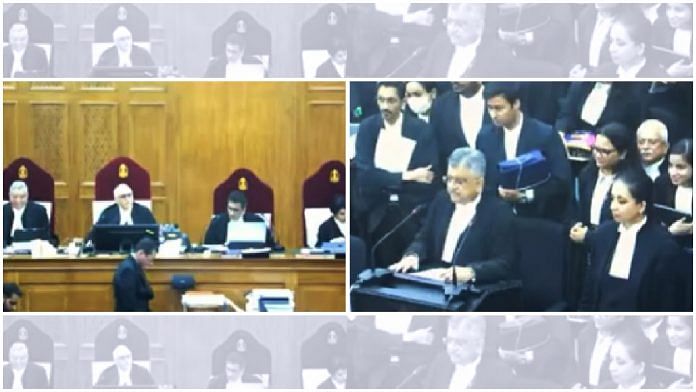New Delhi: The governments of Rajasthan, Andhra Pradesh and Assam are opposed to the legalisation of same-sex marriage, a constitution bench of the Supreme Court was told Wednesday as it heard a batch of petitions demanding marriage equality for homosexual couples.
While these states have outrightly rejected the idea, according to documents placed before the court, Manipur, Uttar Pradesh, Maharashtra and Sikkim have called for a detailed assessment of existing social customs, practices, values, rules etc. prevalent in different sections of society.
Solicitor General Tushar Mehta, who, on behalf of the central government, has opposed the petitioners’ demand, informed the bench led by Chief Justice D.Y. Chandrachud that Rajasthan had written to the Centre in response to the latter asking states for their views on the subject.
Mehta further said that seven states had replied to the central government’s letters that were sent around the same time the bench commenced its hearing on the petitions. He placed the responses before the bench for perusal and consideration.
It may be recalled that at the outset, the solicitor general had urged the court to issue notices to all states and make them parties in the case so that a holistic view is taken by the bench. This request was made in view of the fact that marriage and divorce find mention in the concurrent list of the Constitution, which means the State can also make rules or guidelines in connection with it.
Also Read: ‘Elements of marriage protected by Constitution’, says SC as it hears same-sex marriage pleas
‘Can cause disharmony’ to ‘need for meaningful consultations’
Rajasthan has stated that marriage is a vital societal institution and same-sex marriage can cause disharmony, as it would not be accepted by any community or member of society.
It has also said that public opinion is expressed through elected lawmakers and if it was in support of same-sex marriage, then these representatives would have deliberated at the appropriate forum to have a law on the same.
The state further submitted that the Navtej Johar judgment, which decriminalised homosexual relations in India, was on the limited issue of whether it is a crime to be in a relationship with a same-sex partner. That verdict cannot be cited as a precedent in the pending matter on marriage equality, it stated.
The Uttar Pradesh government meanwhile referred to same-sex marriage as a sensitive subject, affecting various sections of society and different religious denominations. “The state government cannot formulate its comprehensive response without wide consultation with all sections of society,” it said.
Maharashtra wants to hold “wide” and “meaningful” consultations with a wide cross-section of societies, as the issue would “potentially affect a cross-section of the society in the state, cutting through various religious sections”.
Assam has in its response expressed reservations over the matter being heard in court without involving states. It has said that it would be prudent to maintain that legislation is the prerogative of the legislature at the Centre and its states, as it “reflects the collective wisdom of the nation and its citizens”. The state government has asked for copies of the documents that have been placed in court.
Sikkim and Manipur want an in-depth study to be conducted before any decision is taken on same-sex marriage, while a detailed response from Andhra Pradesh said that the state government had consulted the heads of various religions. After seeking their opinion, the state has concluded that it does not favour same-sex marriage.
‘You cannot fathom fallout’, respondents close arguments
Meanwhile, the respondents in the case, including individual intervenors, who opposed the petitions, wrapped up their arguments. Solicitor general Mehta also made some concluding remarks in which he expressed concern over the court’s proposition that it was possible for it to make a declaration (on same-sex marriage) without modifying the Special Marriage Act (SMA), which can then be followed by government framing a legislation.
The solicitor said that it “may not be a correct course of action” because even a declaration would bind the whole nation, not just courts.
“The difficulty would be that any declaration of law would bind every individual in the country who is not before this court,” the law officer added. “It would also pre-empt and prevent any debate on the issue, which, in the Centre’s view, is absolutely essential considering the very sensitivity and social impact of the issue involved.”
Mehta further said that it was not possible for the court to fathom the fallout of the declaration and only the legislature can do so and also regulate it. “You cannot foresee or envisage or comprehend the fallout,” he said.
‘Judges should not be buffeted by majoritarian view’
Senior advocate Abhishek Manu Singhvi, who appeared for one of the petitioners, commenced his rejoinder submissions in the case. He called out the central government for placing reliance on the legislature to meet the demands raised by the petitioner.
“I shall deal with this bogey,” he said, adding that the Constitution is supreme and that courts interpret rights in a counter-majoritarian manner, against majorities, elected legislatures and elected majorities.
“Unelected judges are masters of interpretation of the Constitution. They should not be buffeted by the majoritarian view or there will be tyranny,” the counsel argued, adding that there will be no advancement in law if the court gets swayed by the majoritarian argument.
(Edited by Gitanjali Das)



